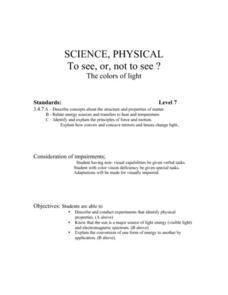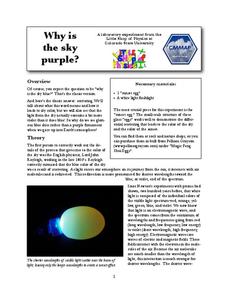Curated OER
Electromagnetic Energy and Its Spectrum
Your older elementary students investigate electromagnetic energy and the electromagnetic spectrum. They will observe 7 items represented in the electromagnetic spectrum and make a poster of all the things the items have in common. After...
Curated OER
Can You See the Light?
Young scholars investigate the transmission of light energy. In this light energy lesson, students observe bubbles using different colored filters and record their observations. They also look at a light source through various materials...
Colorado State University
What's the Difference Between Blue Light and Red Light?
Finally, an electromagnetic spectrum lab that will get glowing reviews from your class! Explore the nature of light using red and blue LED sources and fantastic phosphorescent paper. Young scientists compare the effects of blue light...
Curated OER
Sunrise/Sunset
Third graders discovver what causes the dramatic colors of a sunset by seeing the changing color of light as it passes through a clear container of water to which milk is gradually added. They measure the liquids and observe what happens...
Curated OER
Solar Electricity ~ The Colour Sensitivity of a Photovoltaic Cell
Teacher's notes, a materials list, detailed procedure, tips, and extension ideas are all included to make teaching this lesson on photovoltaic cells a sunny spot in your day! After some brief background reading, physical science...
Curated OER
Blinded by the Light
Students recognize that the colors they see are a result of the reflection of light. In this light and color lesson, students predict what color will be produced when lights are mixed. They identify the three primary colors and secondary...
Curated OER
The Photoelectric Effect in Photocells
Illuminate your physics class with this examination of a photovoltaic cell. Teach the structure and operation of the device using a diagram. Then make a human-powered, larger-than-life sized model of a PV cell. Learners become electrons...
Curated OER
Kaleidoscope
Students explore energy by creating a light project in class. In this kaleidoscope lesson, students discuss the properties of light and how mirrors can reflect the energy in different directions. Students view a diagram of light...
Curated OER
The Effects of Light and Temperature on the Growth and Development of Plants
Young scholars investigate the effects of light and temperature on plant growth and development. In this plant growth lesson plan, students use radish plants and cover them with different shades of green and red transparencies and...
Curated OER
Wavelengths of Light
Explore physical science by participating in a visual spectrum experiments. Budding scientists identify the colors in the color spectrum and view the colors in class by utilizing cellophane, flash lights, and other arts and crafts...
Curated OER
Shrinky Dinks® Palettes
Here is a fun and clever lesson for teaching physics classes how to calculate wavelength if given the energy and frequency data. On a worksheet, they compute wavelengths using a table of information that you provide. On a paper palette,...
Curated OER
Black and White Bottle Experiment
Students investigate solar energy and color. In this solar energy instructional activity, students assess the benefits of solar energy. Students discover that solar energy is attracted to darker colors and conduct an experiment...
Curated OER
Flame Tests
Students perform flame tests on 12 elements. In this flame tests lesson plan, students experiment with elements to observe their visible light spectra emitted as electrons jump from one energy level to another. Students record their...
Curated OER
To See or Not to See: The Colors of Light
Seventh graders describe and conduct an experiment that identifies the physical properties of light. They explore sources of visible light and an electromagnetic spectrum. Students explain the conversion of one form of energy to another.
Curated OER
Light Week
First graders experiment with prisms to explore sequence of colors of light created.
Curated OER
Help Wanted: A Lighting Engineer For Popular Rock Group
Young scholars are assigned to groups, and determine each member's role in the group. They will design an experiment to determine a way to produce the three primary and five secondary colors. Students discuss color and mood. They listen...
Curated OER
Understanding Light: Lesson 2 - The Electromagnetic Spectrum
Learners investigate the Electromagnetic Spectrum and realize there is energy beyond visible light. They identify parts of the EM Spectrum.
Colorado State University
Why Is the Sky Purple?
The color of the sky depends on the time of day. Young scholars experiment with scattering different wavelengths of light to recreate the color of the sky. They observe both the longer blue wavelengths and the shorter red and orange...
Curated OER
Check Out Lights and Shields with Beads
Learners explore Ultraviolet detecting beads and conduct several investigations with them. In this investigative lesson students participate in an experiment to see the harmful effects of UV light and discuss their findings.
Curated OER
Light
Students examine how light waves travel. In this properties of light lesson plan, students observe how light travels in water, how light is reflected and refracted, and how light is pure energy.
Curated OER
The Color of Light
Students explore the components of light as a combination of several colors. The focus of the lesson reveals that objects are viewed in a certain color because that color is reflected off of the object.
Curated OER
Bubble-ology
Students observe the visible spectrum while observing light hitting the surface of bubbles. They blow large bubbles and observe how the colors change.
Curated OER
Measuring the Wavelengths of Visible Light
Students demonstrate use of an Emission tube power supply, a diffraction grating, and a scientific calculator to determine the different wavelengths of light.
Curated OER
Everybody Needs a Little Sunshine
Three activities introduce upper elementary ecologists to photosynthesis and food webs. In the first, an experiment is set up to determine how plants respond to different types of light. In the second, they connect organism cards with...























